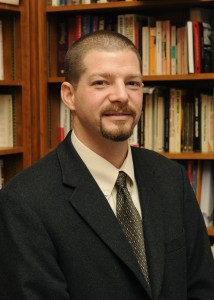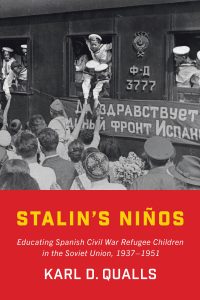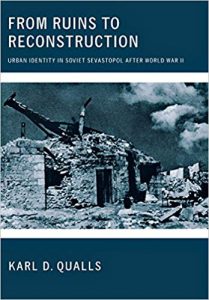 For more information, please see my abbreviated CV. I have also recently filmed a series of video lecture. Feel free to visit the Time Capsules channel on YouTube.
For more information, please see my abbreviated CV. I have also recently filmed a series of video lecture. Feel free to visit the Time Capsules channel on YouTube.
“In his compelling and informative account of the casas de niños, boarding schools created to educate but also confine nearly 3,000 Spanish refugee children who arrived in the USSR in 1937 and who were soon to endure further upheaval during the Great Patriotic War, Karl D. Qualls sheds fresh light on Soviet education and nationality policy at a critical juncture. Stalin’s Niños deserves to be read by anyone interested in ambitious state-led attempts to mold the behaviour, personality, and outlook of young children whose lives were disrupted by war and other calamities.” Prof. Peter Gatrell, author of The Making of the Modern Refugee and The Unsettling of Europe: How Migration Reshaped a Continent
“By exploring the intersection of representation, context, and experience, Stalin’s Niños tells a remarkable human story while also illuminating central themes of twentieth century European history at the intersection of political power, educational institutions, and individual survival…This book effectively cultivates a sense of empathy for the experience of these children while engaging critically with source materials, questioning hagiographical accounts, and advancing scholarly understanding of broad questions about power, identity, and community. In Stalin’s Niños, Qualls provides an exemplary model of how excellent scholarship can tell memorable stories about extraordinary lives.” Review by E. Thomas Ewing author of The Teachers of Stalinism: Policy, Practice, and Power in Soviet Schools in the 1930s and Separate Schools: Gender, Policy, and Practice in the Postwar Soviet Union
“Scholars finally have begun telling the story of rebuilding bombed cities in the former Soviet Union, and with this solidly researched, well-written book, Karl D. Qualls is leading the way. Sensitive to the nuances of both Soviet and local politics and the distinctive cultural features of Sevastopol, Qualls argues that rebuilding Sevastopol was a classic center-periphery contest, with local initiatives on both urban planning and architectural style prevailing over policies coming from Moscow. The result was more a recreation of the nineteenth-century city than a creation of a city along Stalinist lines.”
—Jeffry Diefendorf, Pamela Shulman Professor of European and Holocaust Studies and Professor of History, University of New Hampshire, author of In the Wake of War

